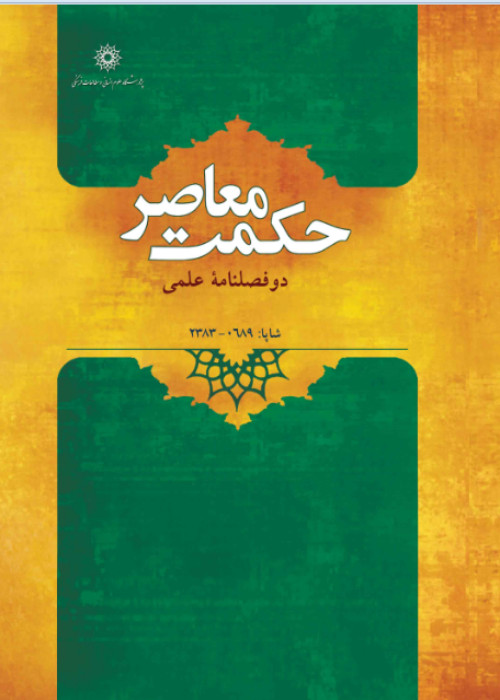The Relation between Prophetic Revelation and Non-Revelatory True Dream in Fārābī’s View
The study of the nature of prophetic revelation (waḥy risālī) is a tenet of any study of revelatory religions; that is, Islam, Christianity, and Judaism. There are different ways to study and know the revelation. One such way is to make recourse to similar capacities possessed by ordinary people; that is, those who are not prophets. True dreams are a case in point. Indeed, non-revelatory true dreams are significant things occurring to humans, and they have been studied by Muslim philosophers. One relevant question here is: are true dreams of the same category as prophetic revelation, and thus, can we learn more about the latter by knowing about the former? If they have an identical nature, then knowledge of one might lead to knowledge of the other, in which case, the method of knowing prophetic revelation based on true dreams, and vice versa, will be rendered rational, opening the path toward expansive future research. On the other hand, if they are just partially similar, without being of an identical nature, then although knowledge of one might partially help knowledge of the other, it cannot yield full-fledged knowledge thereof. Crucially, there are religious texts in which true dreams and prophetic revelations are said to be related to each other—e.g. the former is said to be one-fortieth or one-seventieth of the latter. This has prepared the ground for philosophical reflections on the relation between the two notions by Muslim philosophers. In this research, we aim to examine the similarities and distinctions between non-revelatory true dreams and prophetic revelations according to an influential philosopher in the history of Islamic philosophy: Fārābī. Some points about the background of the issue are in order. To begin with, although Fārābī dealt with an analysis of revelation as well as dreams, he was not primarily concerned with the similarities and distinctions between the two, and hence, no direct answer to the above question might be found in his work. Second, although his commentators have considered his account of revelation and sometimes dreams, they were not primarily concerned with the similarities and distinctions between the two. Third, contemporary scholars and authors have sought to account for prophetic revelation in terms of dreams from a phenomenological viewpoint, independently of Fārābī’s account. However, this is founded on the wrong assumption that we adequately know dreams, and thus, we can draw on such knowledge to know prophetic revelation. The present article seeks to consider whether we can properly know prophetic revelation in terms of dreams, and vice versa. This means that we are not concerned with an independent study of either of these phenomena. The method of the article is as follows: it cites the work by Fārābī and his commentators, derives the characteristics of true dreams and prophetic revelation, and having analyzed their similarities and differences, it provides an answer to the main question above. Roughly speaking, a consideration and analysis of the work by Fārābī and his commentators leads us to the conclusion that the two phenomena are remarkably similar in his view, and on account of such similarities, one might subsume prophetic revelation and true dreams under one and the same category. This means that knowledge of one might lead to an understanding of the other, although there are distinctions between the two, which preclude their identification. As to the similarities between the two phenomena, we have found the following in Fārābī’s work: (1) in both prophetic revelation and true dreams, the rational human soul is connected to the Active Intellect (al-ʿaql al-faʿʿāl), and in this way, it receives universal and particular fragments of knowledge, without any reflections or education—which are often necessary for other kinds of knowledge, (2) both of these phenomena involve the imaginative faculty, which has the function of representation. That is, when receiving fragments of knowledge from the Active Intellect or other supernatural sources, the knowledge in question is sometimes formless, in which case the imaginative faculty functions to give a particular form to this formless entity, and sometimes it gives another form to a truth that already has a form, and (3) since the imaginative faculty is involved, both true dreams and revelations are sometimes in need of interpretations. Nevertheless, a prophet is discriminated from a dreamer due to his sacred power, acquired intellect (al-ʿaql al-mustafād), strong imaginative faculty, and immunity to errors in receiving the revelation. We conclude that while we might make partial inferences from one phenomenon to the other, knowledge of one is not tantamount to that of the other. The distinction between true dreams and prophethood is a matter of degrees; that is, while they share certain characteristics, each has its own peculiarities as well. On the whole, it is plausible to make inferences from dreams to revelation and vice versa, but the limitations of such inferences, because of their differences, must be taken into consideration
- حق عضویت دریافتی صرف حمایت از نشریات عضو و نگهداری، تکمیل و توسعه مگیران میشود.
- پرداخت حق اشتراک و دانلود مقالات اجازه بازنشر آن در سایر رسانههای چاپی و دیجیتال را به کاربر نمیدهد.




